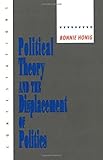Bonnie HONIGのPolitical Theory and the Displacement of Politics(Cornell University Press, 1993)を暫く前から読み始めている。

Political Theory and the Displacement of Politics (Contestations)
- 作者: Bonnie Honig
- 出版社/メーカー: Cornell Univ Pr
- 発売日: 1993/05/01
- メディア: ペーパーバック
- クリック: 8回
- この商品を含むブログ (13件) を見る
このような政治理論をHonigは”virtue theories of politics”と呼ぶ;
Those writing from diverse positions—republican, liberal, and communitarian—converge in their assumption that success lies in the elimination from a regime of dissonance, resistance, conflict, or struggle. They confine politics(conceptually and territorially) to the juridical, administrative, or regulative tasks of stabilizing moral and political subjects, building concensus, maintaining agreements, or consolidating communities and identities(p.2).
”virtue theories of politics”として名を挙げられ、本書の中で批判の対象となるのは、Immanuel Kant、John Rawls、Michael Sandel*2。それに対して、”virtu theories of politics”とされるのはニーチェとアレント。
The theories that displace conflict, identify politics with administration and treat juridical settlement as the task of politics and political theory I call virtue theories of politics. The theories that see politics as a disruptive practice that resists the consolidations and closures of administrative and juridical settlement for the sake of the perpetuity of political contest I call virtu theories of politics(ibid.).
もう少し抜書きを続ける;
Virtue theorists of politics assume that the world and the self are not resistant to, but only enabled and completed by, their favored conceptions of order and subjectivity. This assumption undergirds their belief that modern disenchantment, alienation, pain, and cruelty would be diminished if only we adopted their principles of right, established just institutions whose fairness is ascertainable from a particular(rational) perspective, or yielded to the truth of membership in a wider community of meaning and value(p.3).
”virtu theories of politics”において重要なのはremainder(残余、余剰)という概念である。Honigは、virtuについて、ニーチェを踏まえて、”an ethical perspective that calls attention to the remainders of system, to the insistences, cruelties, deceits, and inconsistencies, of virtue as a system of values”と仮の定義を行っている。このremainderはそもそもBernard Williamsから借りてきたものである。元々は”the moral oughts that’s are not acted on in dilemma situations”を意味していた。それをHonigは、”a much broad array of resistances engendered by (a broader variety of) rather ordinary human attempts systematically to organize the world conceptually, categorically, linguistically, politically, culturally, and socially as well as morally”を含意するよう拡張している。Honigは説明のために、算数のアナロジーを使う――100÷11=9余り(remainder)1。この「余り(remainder)1」をBernard Williamsの場合にはそもそも存在していたものとしてものとして理解されてしまうという。しかし、Honigによれば、「余り(remainder)1」は「割り算の過程それ自体」によって生み出されたものである。”the institutional process that engender remainders”が注目されなければならない。そうすれば、日常的状況と(Bernard Williamsがいう)”tragic situations”との差異は相対化される筈であると(p.213, Note 1.)。
Unfortunately, the assumptions, goals, and yearnings of the virtue theorists tend to erase the resistance from political orderings and the struggle from subjectivity, eliminating the excess that haunts the formation of the self into a subject and expelling the disruption from politics. These are the site on which virtu theorists make their stand. Whereas virtue theorists assume that their favored institutions fit and express the identities or the formations of subjects, virtu theorists argue that no such fit is possible, that every politics has its remainders, that resistances are engendered by every settlement, even by those relatively enabling or empowering. It is for the sake of those perpetually generated remainders of politics that virtu theorists seek to secure the perpetuity of political contest(ibid.).